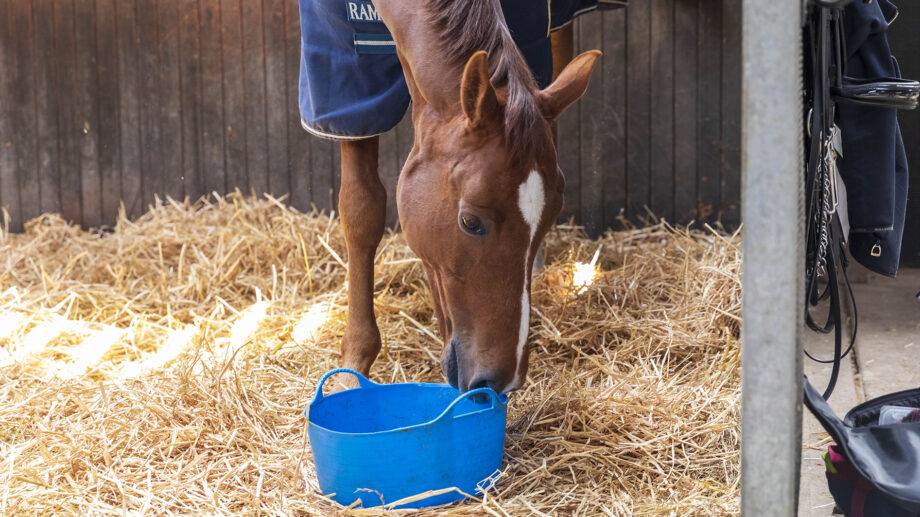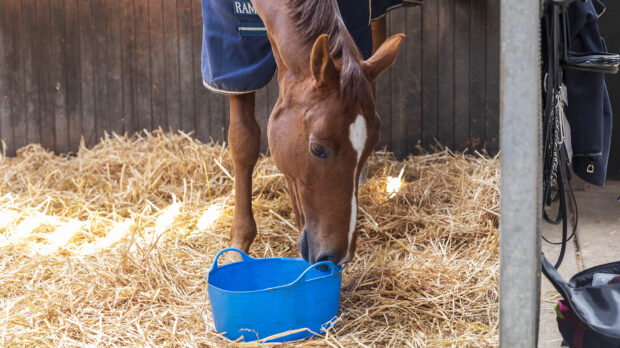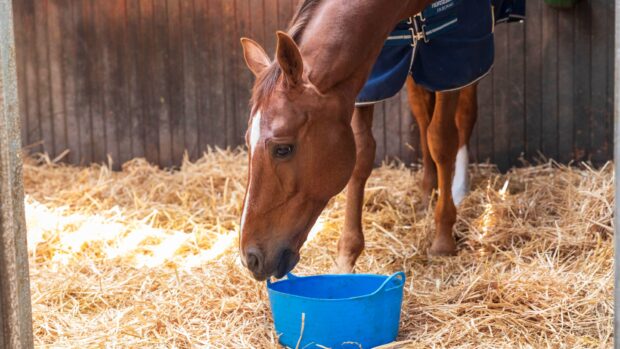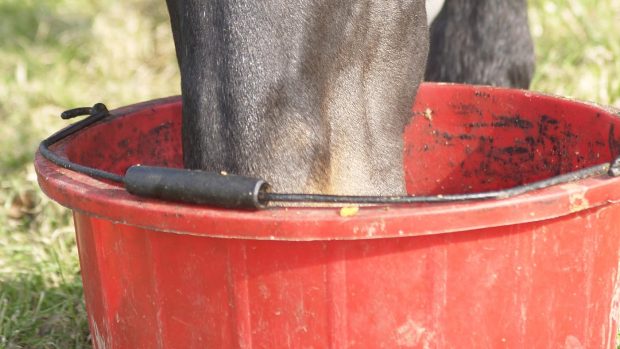Few aspects of horse ownership are as worrying as an injured horse, stuck on box rest. Managing their diet and feeding a horse on box rest is one of the major problems owners need to address, because the horse cannot graze and forage naturally, potentially for months. Lacking exercise or any movement, some horses will put on weight. Others will stress the weight straight off. And box rest increases the risk of colic, as the horse’s digestive system functions best when the animal is moving. We asked some equine nutritionists if there is anything balancers can do for box-resting horses.
According to Katie Grimwood, BSc (Hons), the senior nutritionist at Bailey’s, feed balancers are actually quite helpful.
“Correct nutrition may actually aid soft tissue healing by providing the nutritional components for repair,” she says. “Amino acids, for example, are the building blocks of protein and are essential for soft tissue construction. Essential amino acids (those not synthesised within the horse’s body), such as lysine and methionine, are particularly good for supporting repair.”
Katie advises that forage won’t provide enough nutrients.
“It does not contain the quality protein required to supply plenty of essential amino acids, although alfalfa is a good source of the amino acid, lysine.”
Lizzie Drury, the senior nutritionist at Saracen Horse Feeds, agrees that a balancer could be a useful addition to the recuperating horse’s diet, explaining: “When you have a horse that is on box rest or convalescing, a feed balancer is a convenient way to provide essential amino acids, antioxidants, prebiotics and probiotics that will help to support the immune system and maintain a healthy digestive system. Sick horses may also have limited appetites and feed balancers can help to stimulate intake and deliver a high plane of nutrition in a small amount of feed.”
The box-resting horse should still be given ad lib forage, as it gives him something to do and helps prevent digestive complications. Kate Hore, RNutr (Animal), registered nutritionist with NAF, says: “A horse out of work should be on a high fibre, low energy diet with little or no hard feed.” She adds: “However, those micronutrients are still essential — after all, they are required for repair and regrowth, so are an essential part of your horse’s return to fitness.”
Unlike feed made out of whole cereal grains, balancers don’t provide the horse with as much buzzy energy. Getting into the science of it, Kate explains: “Starch and sugar are the primary sources of quick release energy within the diet, with high intakes of these being commonly associated with excitable or fizzy behaviour. Starch is found in higher amounts in whole cereal grains such as oats, maize, wheat and barley. Digestion breaks the starch molecule down into separate glucose molecules which are absorbed straight into the blood stream in the small intestine.
Cereals are therefore known for supplying quick release energy, as they are easily digested and can be used much quicker than energy from fats and fibre. Due to the small feeding rates of balancers (typically 100g per 100kg of bodyweight), the starch and sugar contributions will be minimal, making them ideal for horses that can be fizzy while their workload and energy expenditure is reduced.”
Clare Barfoot, RNutr, the marketing, research, and revelopment director at Spillers, also emphasises the importance of forage, which “will keep [the horse] occupied, fulfil his desire to chew and reduce his risk of developing gastric ulcers.” She continues: “In such circumstances, nutrition support in the form of balancer every day will help support the forage-based diet, providing essential daily vitamins and minerals but without the extra calories which are not often needed when a horse is out of work.”
It is critical that owners choose the right balancer for the box resting horse. Some have more protein than others. Kate stresses that owners need to provide “quality protein, without providing excess quantity of protein.” While protein such as lysine is essential for repairing tissues, a balancer, or any feed, that adds too much protein can result in unwanted weight gain. If your horse is the type to gain weight easily, that is something to be avoided. She also says: “Another important factor for both the horse and their carer, is that excess protein will mean excess nitrogen is excreted as urea — resulting in very wet beds, lots of mucking out, and the potentially damaging irritant effects of ammonia — definitely one to be avoided!”
However, if your horse is prone to being stressy and loses weight easily, a balancer alone won’t be sufficient for keeping condition on it. Katie says: “For these types, using low starch conditioning feeds, which are instead high in fibre and oils, may be more beneficial.”

How to feed a horse on box rest to maintain health and aid recovery

Best feed balancers for all horses: what’s on the market?

How to choose the right feed balancer for your horse

Subscribe to Horse & Hound magazine today – and enjoy unlimited website access all year round
Horse & Hound magazine, out every Thursday, is packed with all the latest news and reports, as well as interviews, specials, nostalgia, vet and training advice. Find how you can enjoy the magazine delivered to your door every week, plus options to upgrade your subscription to access our online service that brings you breaking news and reports as well as other benefits.




